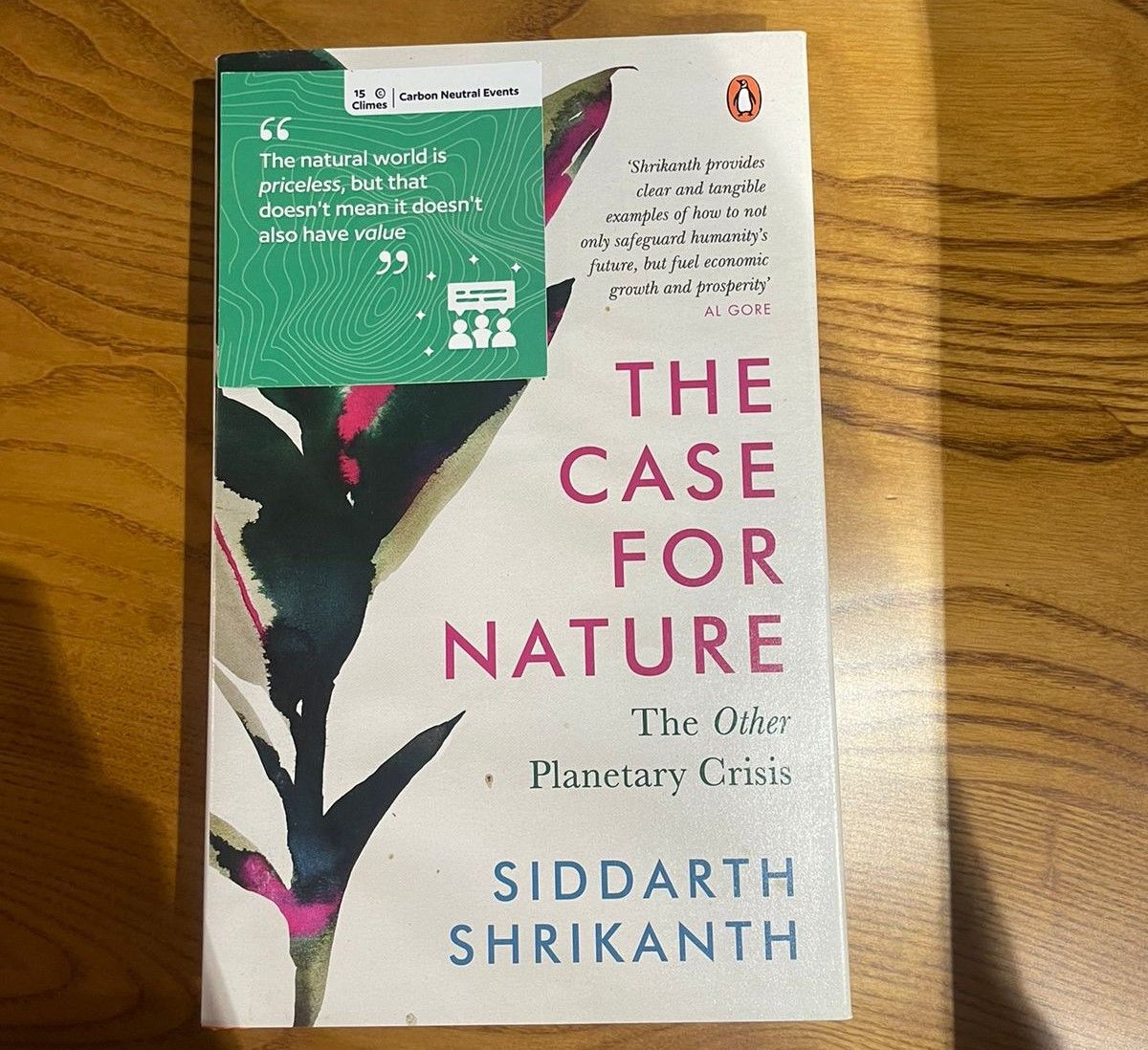The Case for Nature: A Fireside Chat with Siddarth Shrikanth

I was first introduced to Siddarth Shrikanth in 2022. Back then, he was still in the process of writing his book and I remember feeling incredibly excited to learn that he was concerned with and addressing the question of how to find economic value in the preservation of nature. We spoke about the importance of economic incentives to grow and protect natural assets, and agreed that this was likely to be one of the most powerful solutions at our disposal to reverse the climate crisis.
It was motivating, then, to meet someone in the industry with a similar perspective and belief - and it is amazing now to see those beliefs materialise in the form of his wonderful book, The Case For Nature. Last week, Climes had the honour of hosting Siddarth Shrikanth in Bangalore for a fireside chat about his new book and the potential for nature-based solutions to reverse climate change. Here are some key insights we've gained from his book and the chat:
"Natural Capital". What is it? Why is it important?
In his book, Siddarth talks about the concept of "Natural Capital". He describes it as a framework to help us recognise "a sliver of the value that we derive from the natural world: the ways in which our natural assets, like forests and oceans, can provide a range of ecosystem services that represent economic and social goods." Why shouldn't clean air and water, or fertile soils and pollination, be valued as much as gold and silver? In order to protect and restore nature, we have to stop viewing it as something separate and distant from ourselves - to be enjoyed only occasionally. We have to find a central place for it in our economic framework.
India: A safe market for investing in nature
"Natural Assets", as Siddarth refers to them, are still very much abundant - especially in the Global South. But what makes a forest in the Democratic Republic of Congo different from one in India or Indonesia? Countries like India, China, Brazil and Indonesia possess functioning markets, with already existing domestic investors - making the overall investment climate far more attractive and feasible than other more politically volatile countries. In fact, as an emerging economy with a government that is growing more conscious of the importance of sustainability - India is well positioned to become the centre of innovation in the climate space.
Voluntary Carbon Markets as tool to create value in nature
As a rule, humans have largely gravitated towards valuing the physical aspects of nature. A forest was valuable because of the wood we could cut from it to manufacture and trade goods. According to Siddarth, the advent of Carbon Credits and Voluntary Carbon Markets present one of the first viable pathways we have to turn this incentive system on its head. Using various examples from his personal experience he illustrates how a Carbon Credit can place value in the "regulating services of nature", like the ability of a forest to sequester carbon, above all else. And in doing so, it incentivises capital to flow towards protecting, preserving and growing the forest - as opposed to cutting it down.

Governments and the Public Sector have a role to play
Siddarth draws attention to the unfortunate reality that a lot of governments incentivise extraction over preservation through their governance systems, like subsidy schemes - especially in the agricultural sector. Too often, governments "entrench the system that has turned working land into an ecological desert". Going forward, governments and the public sector as a whole have a responsibility to shift their approach so that other societal actors, like citizens or corporations, find it economically viable and practically feasible to make the shift to more sustainable practices. Without this coordinated effort, progress will remain elusive.
Regenerative Agriculture as a promising solution
In his book, Siddarth describes Regenerative Agriculture as a way to "feed the world without costing the Earth". RegenAg refers to the implementation of sustainable farming practices, like zero till and cover cropping, in order to sequester more carbon in the soil and improve the livelihoods of farmers through financial incentives. During our conversation, we spoke about the ways in which RegenAg can help align incentives to protect soil and the environment, in addition to improving yields and economic returns for farmers in the long run. Most importantly, it will help farmers prepare against a warming climate and all the challenges that come with it.
As someone who is deeply involved in this industry, it was incredibly inspiring to have had this discussion on how we can scale up nature-based solutions in India and protect biodiversity. Siddarth makes the case for the importance of nature in a way that is eloquent, moving and informative - at once inspiring you to act while also showing you how to begin taking that action. And while I leave you with a quote from Siddarth about the value of nature, I am thinking more about the value of having people like him in the climate industry. Thank you Siddarth for a truly wonderful conversation! I urge everyone to please follow the link below and pick up a copy of his vitally transformative book.
"The natural world is priceless, but that doesn't mean it doesn't also have value".

Acknowledgements
Thank you to PeakXV for generously giving us the space for hosting this event. And to Prajay Raghu, Riya Sarda and Saba Rajkotia for helping to bring the event together.
Who is Siddarth Shrikanth?
Siddarth grew up in Chennai, India and studied conservation biology and climate science at Oxford. He then worked in corporate sustainability for McKinsey in the UK and Indonesia before moving to Hong Kong to be a foreign correspondent for the Financial Times. He holds a joint MPA/MBA from the Harvard Kennedy School and Stanford's Graduate School of Business, and co-founded a natural carbon removal start-up called Working Trees. He is now based in London and works on investing in nature and climate.

